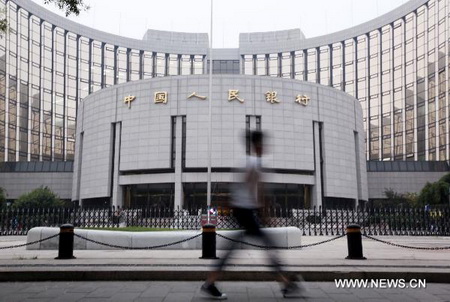Biz News Flash
China's central bank raises interest rate
(Xinhua)
Updated: 2011-07-07 09:53
 |
Large Medium Small |
|
 A man walks past the office building of the People's Bank of China (PBOC) in Beijing, capital of China, July 6, 2011. The PBOC, China's central bank, announced on Wednesday that it will raise bank's benchmark one-year borrowing and lending rates by 25 basis points beginning Thursday.[Photo/Xinhua] |
BEIJING--The People's Bank of China (PBOC), the central bank, announced on Wednesday that it will raise bank's benchmark one-year borrowing and lending rates by 25 basis points on Thursday.
This is the third time for the central bank to raise interest rates this year. The previous one occurred on April 5.
Meanwhile, the central bank has hiked the reserve requirement ratio for banks six times this year.
| ||||
Inflation data for June will be released on July 15 and many economists forecast it will hit a new high above 6 percent.
Food prices have been increasing, some dramatically. Pork prices rose for the 10th consecutive week as of June 26 and the wholesale price of pork was up 68 percent from a year earlier, according to the Ministry of Commerce.
China will continue to implement a prudent monetary policy as inflationary pressures still remained high, said a statement on the website of the central bank on Monday.
The Consumer Price Index (CPI), a main gauge of inflation, rose by 5.5 percent in May from the previous year, setting a 34-month high and well above the government's target ceiling of 4 percent for the year.
The country's top economic planner said recently that overall price levels will be higher in June than May.
The interest-rate hike will help check high inflation and the June CPI data will be 6.2 percent, Lu Zhengwei, chief economist for the Industrial Bank, predicted.
Xu Xiaonian, an economics professor at China-Europe International Business School, wrote in his microblog that the scale is small and even with a 250-basis-points hike, the real interest rate would still be negative.
The real interest rate is the nominal interest rate minus the inflation rate.
After this hike, further such moves will not be likely within this year and the need to again raise bank's reserve requirement ratio will also be low, said Zhu Jianfang, chief economist with CITIC Securities.
But Li Xunlei, an analyst at Guotai Junan Securities in Shanghai, forecast there will be another interest-rate hike in the third quarter.
Guo Tianyong, a professor with the Central China Finance University, said the move is necessary as it can help correct the negative interest rates and manage inflation, but it can also slow economic growth and precipitate inflows of speculative hot money.
The interest-rate hike is not good news for local governments, as they will have to pay higher interest on their debts.
Local government debt totaled 10.72 trillion yuan (1.66 trillion U.S. dollars) at the end of 2010, said an audit report late June.
It's high time to test the local governments (to deal with the debts) as risks of local government debt defaults are increasing, said Xie Guozhong, an independent economist in China.
| 分享按钮 |



